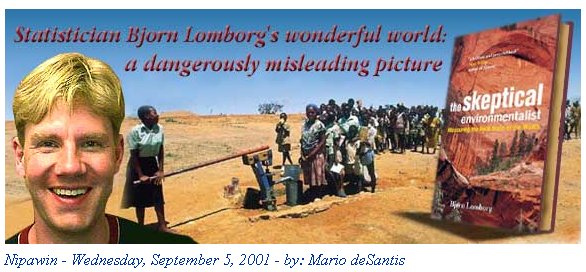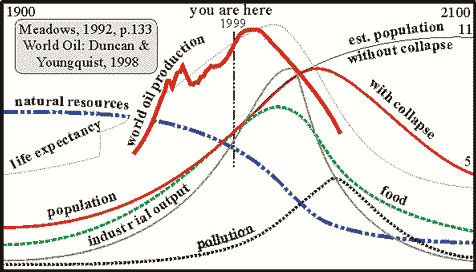Learning Stories
by
Mario deSantis
mariodesantis@hotmail.com
“I am a Canadian, free to speak without fear, free to worship in my own way, free to stand for what I think right, free to oppose what I believe wrong, and free to choose those who shall govern my country.” - -The Rt. Hon. John Diefenbaker, Canadian Bill of Rights, 1960
“The whole judicial system is at issue, it's worth more than one person.”--Serge Kujawa, Saskatchewan Crown Prosecutor, 1991
“The system is not more worth than one person's rights.”--Mario deSantis, 2002
Ensign Stories © Mario deSantis and Ensign
|
|
 "The
reason environmentalists are so often gloomy is that they know what
the word 'exponential' means"-- Donella Meadows "The
reason environmentalists are so often gloomy is that they know what
the word 'exponential' means"-- Donella Meadows
"The problem is, of course, that not only is economics bankrupt but it has always been nothing more than politics in disguise ... economics is a form of brain damage"-- Hazel Henderson
|
We have been talking about the debunking of economic science and the failure of the so-called price system preached by our neoclassical economists and now I am coming across the writing of statistician Bjorn Lomborg telling us that our oil  is
not a finite economic resource otherwise its cost would have been
'very, very expensive.' Statistician Lomborg defends his position
first by belittling the dooming predictions of the earlier
environmentalists who wrote the 1972 bestseller Limits to Growth,
and then by invoking the work of economist Julian Simon. is
not a finite economic resource otherwise its cost would have been
'very, very expensive.' Statistician Lomborg defends his position
first by belittling the dooming predictions of the earlier
environmentalists who wrote the 1972 bestseller Limits to Growth,
and then by invoking the work of economist Julian Simon.Donella Meadows, co-author of Limits to Growth, has specifically stated that "We didn't think we had written a prediction of doom. We had intended to issue a warning, but also a vision. We saw, with the help of the computer, not one future but many, all possible, some terrible, some terrific." It was not an accident that the authors of Limits to Growth used the simulation tool of System Dynamics to develop an understanding of the depletion of our natural resources rather than to predict the future.
It is not an accident that our own Canadian universities, such as Simon Fraser University and the University of Manitoba, have included in their ecological economic curriculums the tool of System Dynamics. The regressive statistical approach of our economists is being questioned, and it is not an accident that I recently sent an e-mail message to the Post-Autistic Economics Network stating that "I firmly feel that economists, in general, would greatly benefit in using Jay Forrester's System Dynamics approach to modeling." I am of the opinion that statistician Bjorn Lomborg would benefit a lot if he could rework some of his statistical researches within the framework of System Dynamics.
Our statistician Bjorn Lomborg is a reductionist researcher and he is being engaged by our controlled media and neoclassical economists to further brainwash people into the gospel of the price system mechanism. In summing up Bjorn Lomborg's claims of a wonderful world, Alex Kirby, BBC News correspondent, acutely observes that "his separate snapshots of the world may be accurate. Taken together, they make a dangerously misleading picture." References Related social and economic articles published by Ensign Donella Meadows, co-author of the books Limits to Growth and Beyond the Limits http://www.netwalk.com/~vireo/meadows.html Global Electronic Markets: The Price of Everything--The Value of Nothing? Hazel Henderson, author, futurist and consultant on sustainable development. May 1998 www.hazelhenderson.com Running on empty?, Bjorn Lomborg, National Post, September 3, 2001 http://www.nationalpost.com/news/story.html?f=/stories/20010903/681803.html Post-Autistic Economics Network, http://www.btinternet.com/~pae_news/GEN.htm Quotes from Julian Simon, Julian Simon was professor of Business Administration at the University of Maryland and a Senior Fellow at the Cato Institute http://www.freedomsnest.com/cgi-bin/qa.cgi?ref=simjul IT'S NO TIME TO HEED THE BROWNLASH, by Paul R. Ehrlich and Stephen H. Schneider http://dieoff.org/page27.htm Bjorn Lomborg's wonderful world, Alex Kirby, BBC News, August 23, 2001 http://news.bbc.co.uk/hi/english/uk/newsid_1502000/1502076.stm |



 Julian
Simon has no clue of the social implications of economics and has
stated "if history is any guide, natural resources will
progressively become less costly, hence less scarce."
Julian
Simon has no clue of the social implications of economics and has
stated "if history is any guide, natural resources will
progressively become less costly, hence less scarce."  Two
billion people live in traditional societies outside the money
system; as a consequence, the price system mechanism to allocate
resources is only in the hegemonic mind set of our neoclassical
economists and statisticians. Stanford University environmentalists
Paul Ehrlich, John Harte and John Holdren were tricked by Julian
Simon and lost a bet against him when they bet that the price of
chromium, copper, nickel, tin and tungsten, would have increased
because of depletion in a time frame of ten years. Julian Simon won
the bet for the simple reason that the price system mechanism is not
a measure of the scarcity of our natural resources. Later, Paul R.
Ehrlich realized his mistake and challenged Simon to bet on fifteen
ecological and population trends whose direction was not positive.
Two
billion people live in traditional societies outside the money
system; as a consequence, the price system mechanism to allocate
resources is only in the hegemonic mind set of our neoclassical
economists and statisticians. Stanford University environmentalists
Paul Ehrlich, John Harte and John Holdren were tricked by Julian
Simon and lost a bet against him when they bet that the price of
chromium, copper, nickel, tin and tungsten, would have increased
because of depletion in a time frame of ten years. Julian Simon won
the bet for the simple reason that the price system mechanism is not
a measure of the scarcity of our natural resources. Later, Paul R.
Ehrlich realized his mistake and challenged Simon to bet on fifteen
ecological and population trends whose direction was not positive.